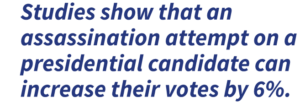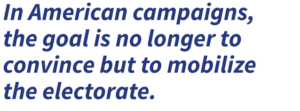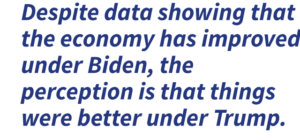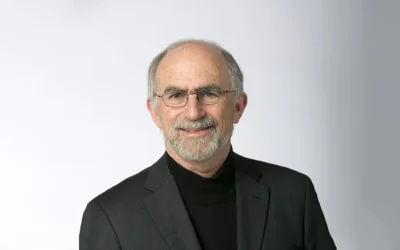Xavier Peytibi: “The 2024 elections reflect a divided society”

This month, we have spoken with Xavier Peytibi to analyze the 2024 U.S. elections, which are shaping up to be one of the most polarized in history. Peytibi, an expert in political and public communication at Ideograma, highlights the intensification of intolerance between different ideologies and how this dynamic is affecting social relationships. He also examines the key role of Kamala Harris as a new figure for the Democrats and the strategies that will shape the political future of the country in an unprecedented electoral mobilization context.
What makes these elections special compared to previous ones?
These elections are completely different. First, because of the candidates—Donald Trump, seeking a return to the White House four years after his term, and Kamala Harris, who replaced Joe Biden midway through the electoral race. But it’s not just that; this is also a unique election due to the extreme polarization in American politics. It’s unprecedented. This polarization is causing less interest among citizens. The landscape is black or white, and that’s terrible for democracy.
But this climate isn’t new. When did it start?
There’s a theory that everything started in 2016: Brexit, Trump, the rise of the far-right… I think it began earlier, with the normalization of radical language. The Tea Party emerged in 2009 as a response to Obama, and it forever changed political discourse. From Trump onwards, this language, which was already normalized, intensified threefold. Everything has worsened since then.
 Is this polarization felt beyond politics?
Is this polarization felt beyond politics?
Yes, especially socially. We’ve seen an unprecedented increase in intolerance between Democrats and Republicans. Mixed-ideology marriages have decreased, and friendships have been broken. It’s surreal. Polarization is a social dynamic that moves based on politics and has escalated in recent years.
How has this polarization influenced political communication?
As the German philosopher Georg Hegel said, from a thesis and an antithesis, we get a synthesis—two opposing ideas come together, complement each other, and evolve. Polarization has broken that dynamic. Now it’s either “I like you” or “I hate you”—there’s no synthesis anymore. Social media has worsened the situation, creating an echo chamber effect.
And in electoral campaigns?
In 2024, polls have shown a firmly decided electorate, with almost no space for undecided voters. We saw this in 2020, with only 5.8% uncertainty the week before the elections. Everything is so decided that campaigns now focus on mobilizing their base rather than convincing moderates and independents, who are becoming fewer. Radical language has only worsened with Trump, giving rise to all kinds of conspiracy theories. The Capitol attack wasn’t sudden—it was the result of years of growing ideas.
So, the Capitol events weren’t solely triggered by Trump?
What we saw at the Capitol was a big fire, but for a fire, you need fuel and an initial spark, which was Trump telling people to go to the Capitol. Many factors are involved, and that takes time. It wasn’t sudden. Many people believe there’s a conspiracy, that Trump was deceived, that there was fraud, and that the left is the enemy of the country.

What impact has this had on the Democrats?
Biden promised to reunite the United States, but polls show that not only has he failed, but polarization has increased. Until Biden resigned, the question was whether he was fit to lead the country. Kamala is changing this narrative, bringing a message of joy and freedom that Trump isn’t prepared to counter.
And for the Republicans?
Polarization wins votes, but it also loses them. Trump has pushed the entire conservative ideology to the right, and in such cases, the center can mobilize against you. The reality is that the Republican Party has disappeared; it’s now Trump’s party. If you want to stay in politics, you can’t go against him.
How do you see Trump’s campaign?
It focuses more about the past than the future. Despite data showing that the economy improved under Biden, the perception is that things were better with Trump. This is purely emotional and very hard to change. He’s a political animal; we saw this when he was attacked at a rally, an event he’s still trying to capitalize on. Everything strengthens his image as a ‘rebel.’
What impact did the attack have on the campaign?
Studies show that an assassination attempt on a presidential candidate can increase their votes by 6%. He reacted well, and his image with his fist raised was powerful, positively influencing his image and the message he wanted to convey. Still, as time passes, the memory fades.
Trump’s 2025 plan focuses on dismantling the “deep state,” strengthening national security, and boosting the economy through deregulation and tax cuts. What impact has this ultraconservative government proposal had?
It’s an example of dog-whistle politics. To the politically engaged right, the 2025 plan is fantastic, but the majority don’t even know what it is. No matter how much Democrats try to use it or how much it’s covered in the media, it only reaches those who care. It’s used as a signal to supporters, reinforcing their ideology.

How would you define Trump’s style?
Trump practices disintermediation—he doesn’t speak to the press because he knows they’ll publish what he writes on social media. The more notoriety he has, the more present he is in the media and social networks, and thus, his message reaches the general public. It’s pure populism—he makes threats, uses radical, catastrophic language… Twenty-five years ago, this would have been impossible; Trump would be in jail and never a candidate, let alone with a chance of winning.
Was the Biden-Trump debate relevant to the campaign’s development?
It was decisive: Biden had to withdraw. It happened so early because the Democrats wanted to demonstrate Biden’s strength and capability in a face-to-face with Trump. Some argue they actually wanted to see if Biden could endure an electoral campaign, giving him a clear reason to step down if he couldn’t. And that’s what happened.
Was it a good strategy?
Perhaps they took too long to decide if he would resign. Throughout that process, there was a sense of division within the Democratic Party about what to do. They projected an unfavorable image, but in the end, their decision drastically changed the elections.
How has Biden’s resignation impacted Trump’s campaign?
He had spent four years campaigning against Biden, building a narrative of a strong leader versus a weak man, the enemy. With Biden’s resignation, everything changed, and Trump is now facing a new landscape. He still hasn’t managed to frame Kamala Harris as the enemy, though he’s trying.

Do you think Harris is a good candidate for the Democrats?
Kamala Harris was the only possible candidate. When she was named vice president in 2020, she represented a minority that needed to be mobilized en masse to vote for Biden. How do you now tell those minorities that you don’t want her? Harris has responded well; she had nothing to lose. She’s brought joy to the campaign, and this shift could give her the victory.
What will these elections depend on?
On whether minorities, especially African Americans and Latinos, mobilize. If they do, they’ll likely vote for the Democrats, and Harris would have a chance. If not, the Republicans will surely mobilize. It also depends on mobilizing swing states like Pennsylvania, Nevada, and Michigan. In American campaigns, the goal is no longer to convince but to mobilize the electorate.
What will happen after the elections?
Depending on the results, everything could change. If Harris wins, the current status quo will continue, both domestically and internationally. If Trump wins, it could pose a problem for Europe and NATO regarding tariffs and financing. Ukraine will face difficulties, especially economically, and China will become the new adversary of the United States, even more so than now.
*Xavier Peytibi is a political and public communication consultant at Ideograma, working on electoral campaigns (presidential, regional, and local), institutional communication, and strategic communication in ten countries. He holds a PhD in Political Science from the University of Barcelona. He is a political scientist specializing in international relations, with a Master’s in the Knowledge Society, a postgraduate degree in Peace Culture, and a postgraduate degree in European Union Structure. He is a professor in numerous political communication master’s programs in Spain and Latin America. He directs the Beers&Politics platform and is the author of the “Creative Politics” newsletter. He has authored books such as “The Connected Campaigns” and “How the Alt-Right Communicates.”






